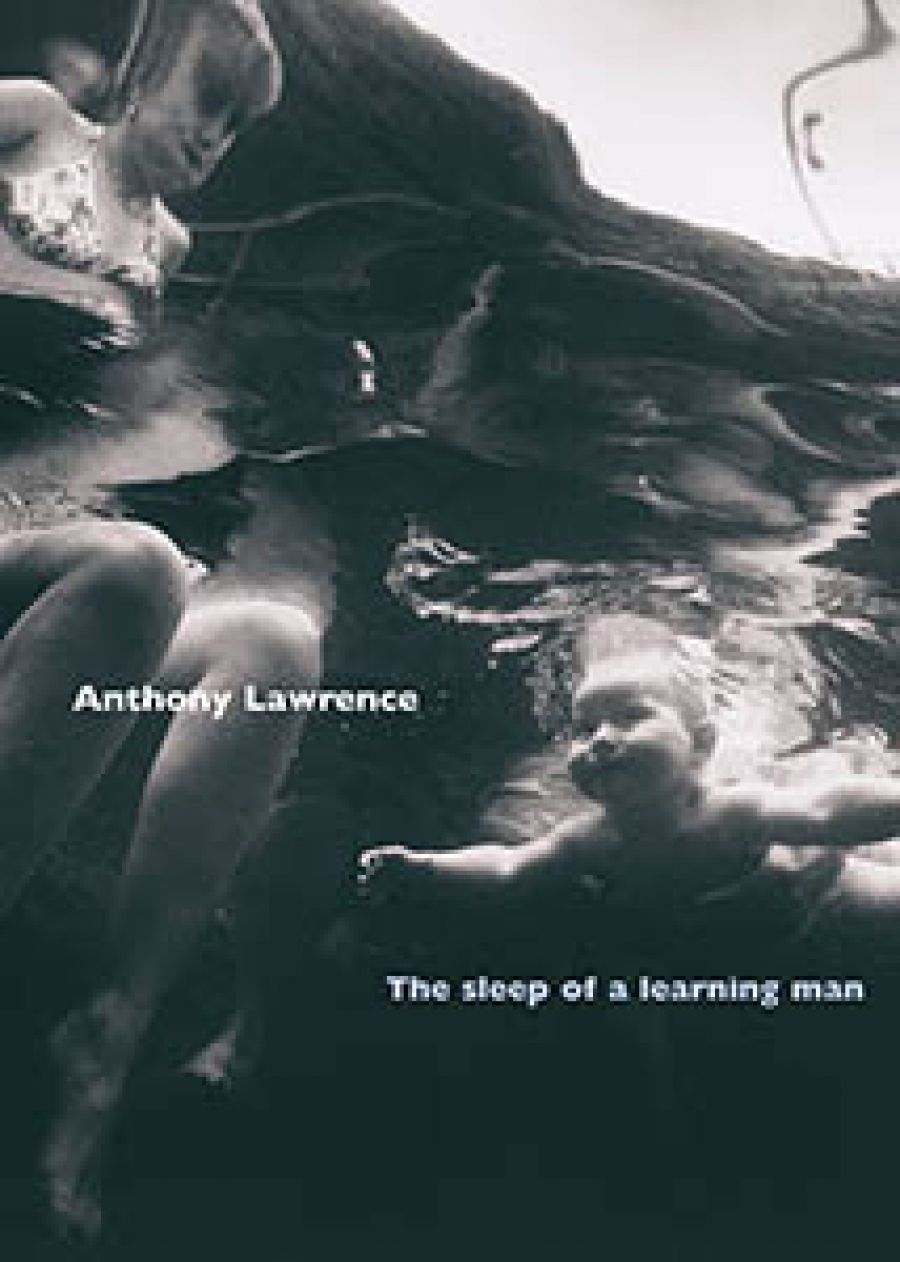
- Free Article: No
- Contents Category: Poetry
- Review Article: Yes
- Article Title: Littoral Days
- Online Only: No
- Custom Highlight Text:
The Sleep of a Learning Man is the sixth verse collection from the gifted and exacting Anthony Lawrence. He has also written a novel. The epigraph to this book gives some hint as to where the poet stands, and where he intends to go. It is from Antonio Porcia: ‘I am chained to the earth to pay for the freedom of my eyes.’ But looking is only one means to find his way, a dilemma that a number of the forty-two poems gathered here confronts.
- Book 1 Title: The Sleep of a Learning Man
- Book 1 Biblio: Giramondo, $22 pb, 112 pp
In several, the poet finds himself on the littoral, where land meets sea. The first poem here begins ‘In late September the dunes / stop moving’, which means that the poet has to face the consequences for his art: ‘The only danger, now the dunes have stopped / is what imagination does.’ Found things on the seashore arrest his attention. ‘Kelp’ begins with a delicate but sustained effort to give a visual sense of the stuff, ‘this pliable, light-keeping amber stem’. The poem shifts into a mantra of love and becomes an unexpected ode.
Lawrence is one of a significant number of poets who have migrated to Tasmania in the last half century, whether from the mainland or beyond. Their concentration is rich, and remarkable. One of the earliest to make such a move was Gwen Harwood, with whose poem ‘Littoral’ Lawrence is surely acquainted. He also does homage to her anthology piece ‘Barn Owl’. In his poem ‘Owls’, one stands sentinel for a dead mate and appears ‘from a distance, a stone roadside marker, then / the face of a clock in a fog’.
In another poem of the fallen things of the natural world, ‘Gathering Pine Cones’, Lawrence writes of how the child (perhaps his son) who accompanies him weighs the cones in his hand, confoundingly, for ‘I have no measure of the calm deliberation / you bring to the earth’s found poetry’. This feeling shifts to a broader dissatisfaction with himself, in the confession, or concession, that ‘I have used the voice of a teaching man too often’. What his art needs, instead, is the dreamwork of the mind at rest, which brings us to the next, the title poem, ‘The Sleep of a Learning Man’.
There are elements of a narrative in this collection: of marriage and separation, of parenthood, of love for his father, and of his father’s death, together with the deaths of one of his grandfathers (recipient of an MBE and author of the ghost-written book It Does Not Pay to Compromise) and of a grandmother. We are not so much teased by the amount we are told as reminded how fragmentary is our knowledge of men and women as they prepare to leave ‘The Extended Narrative of Their Lives’. In the poem ‘What I Know’, Lawrence embraces innuendo, what was overheard and ‘letters … flecked with bloodspots’ to conjure an ‘overwhelming sense’ of a great-grandfather.
In a poem about falling into incomprehension and out of love, the title ‘The Cryptograms of the Head’ is one of the charges that his lover levels against him, through attacking his vocation, which is also for her ‘the empty shells of words’. His response, defiant if defeated, is ‘Responsibility / is an image I’ve been known to use’. Yet the charges reverberate insofar as Lawrence seeks persistently for a delicate particularity of image. There is nothing empty or cryptic about his delineation of the kelp, of a king crab in a tank at Dunalley, ‘rose-plated with resignation’, or of what kills his father: ‘a tumour, like the dark cystitic head of a swamp flower.’
Recalling his father’s death initiates the intense cycle of poems about deaths within his family, the first of them ‘The Language of Bleak Averages’. There the moment of death is pictured: ‘His last breath was long, the exhalation silent. / When they came for him, he might have been someone / still expecting company.’ The loss is gravely faced; the observation is careful, compelling and – responding as poet as well as son – compelled.
It was in the company of his father and uncle that Lawrence’s career began. ‘Hill End, 1963’ (Lawrence was then about six) precedes the poems of bereavement. His father, to whom this volume is dedicated, was ‘a classer of wool, inspector of wheat and manager / of rural personnel’, the uncle ‘a retired professor of things earthed and aerial’. They were prospecting for gold. Lawrence remembers ‘the terrible thirst’, but also something less tangible that occurred that day: ‘something announced itself and set snares behind my eyes – / something formal and free, / trembling and instructive.’ This is both a childhood apotheosis vividly and disturbingly brought back to mind, and an adult reading of himself as a poet. In the complexity and tension, there is an essence of Lawrence’s poetry.
The Sleep of a Learning Man seems an intensification of what has gone before in his career (for instance, in his previous volume, Skinned by Light) rather than a new departure, although the autobiographical burden is more overt. Lawrence has crept up on the audience for Australian poetry. He is now one of the most assured and challenging of our poets. This volume is a testament to craft skills at the service of a relentless self-questioning.


Comments powered by CComment